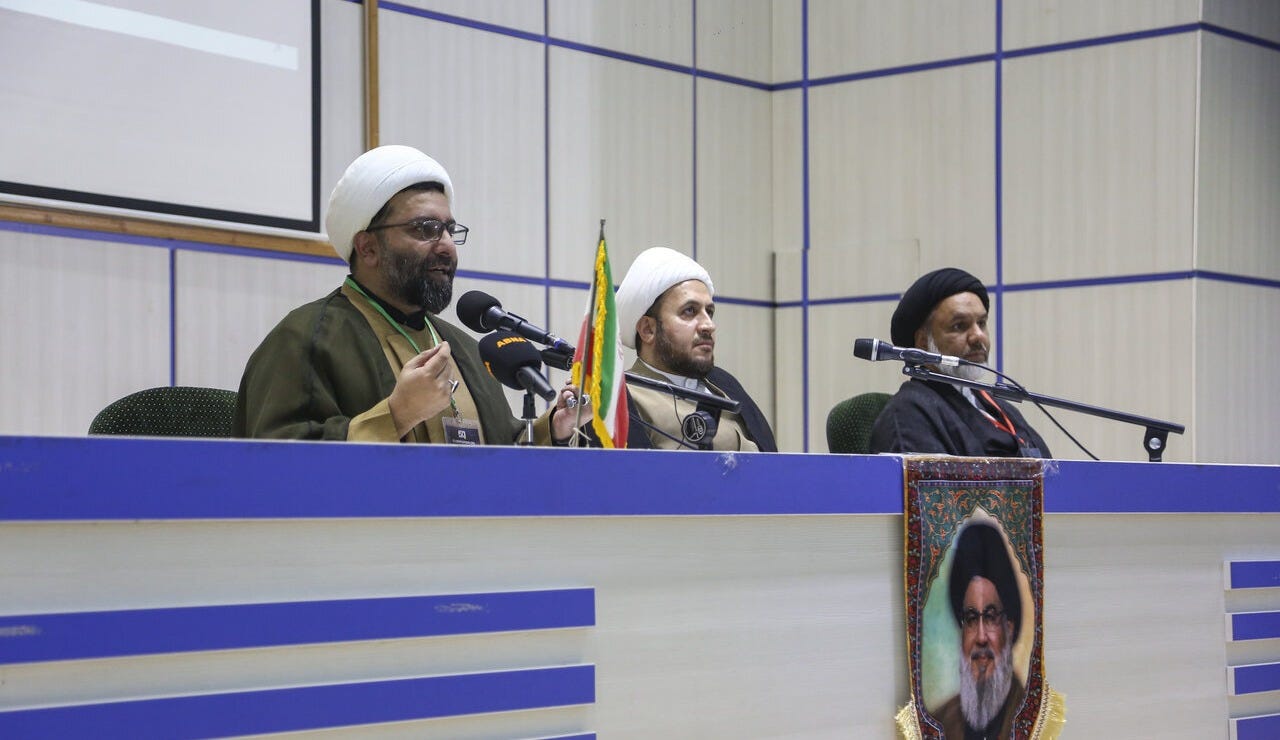Honoring Shaheed Sayyed Hassan Nasrallah: First Anniversary Ceremony in Qom
Scholars and students at al-Mustafa International University commemorate the legacy of Resistance and steadfastness.
Iran, PUREWILAYAH.COM — The first anniversary of Shaheed Sayyed Hassan Nasrallah and other Shaheeds of Islam was marked on Thursday at the Imam Khomeini School in Qom, organized by al-Mustafa International University.
The event brought together seminary scholars, academics, and English-speaking students. After the recitation of the Holy Qur’an, Hojat al-Islam Sayed Shahryar Naqavi recalled the Supreme Leader’s words: “Shaheed Nasrallah was the eloquent voice of Islam.”
The program continued with the recitation of Du’a Tawassul by Ammar, a student from Nigeria.
Academic Guests’ Panel
The first panel featured university guests: Dr. Zohreh Kharazmi, Dr. Ehsan Sharif, Mrs. Marzieh Hashemi, and Dr. Reza Bagheri.
Dr. Kharazmi pointed to America’s financial difficulties since the 2008 crisis, noting high levels of discrimination against women of color in the workforce.
Dr. Ehsan Sharif emphasized the West’s unfulfilled commitments, from France’s abandoned nuclear projects to Britain’s failure to deliver contracted arms. He described resistance as an integral part of Tawhid, embodied by Shaheed Nasrallah.
Mrs. Marzieh Hashemi, of Press TV, said U.S. freedoms end once activism becomes influential, citing expulsions of students and detentions under immigration laws as proof of hypocrisy.
Dr. Reza Bagheri argued that Britain’s global influence has long declined, while recent gestures by the UK and France toward recognizing Palestine are hollow, intended only to buy time for the Zionist project of “Greater Israel.”
Seminary Guests’ Panel
The second panel gathered seminary figures: Hojat al-Islam Sayed Aqa Ali-Reza, Sheikh Mostafa Araki, Sayed Shahryar Naqavi, and Sheikh Ali Qomi.
Sayed Aqa Ali-Reza emphasized that Shaheed Nasrallah was the living embodiment of Wilayah — the principle of guardianship and loyalty to divine leadership.
He explained that Sayyed’s commitment went beyond obedience to explicit instructions; it extended to aligning fully with the intellectual and spiritual framework of the Leader.
This, he noted, was what made Nasrallah not only a political figure but also a believer whose actions reflected deep faith and loyalty.
Sheikh Mostafa Araki offered sharp criticism of Arab rulers, warning that their heavy reliance on U.S. directives has stripped them of both independence and dignity.
He stressed that abandoning the Qur’an and divine guidance has plunged the Islamic Ummah into repeated crises. Quoting the well-known phrase, “If you have no religion, at least be free men.”
He urged today’s leaders to reclaim their honor and act independently, free from external dictates.
Sayed Shahryar Naqavi described the recent twelve-day war not as an isolated clash between Iran and the Zionist regime, but as a broader confrontation in which the entire West rallied behind Tel Aviv.
He pointed to the Zionist project of “Greater Israel,” which seeks to dominate West Asia’s resources.
Quoting Nasrallah’s principle, “You are either with the oppressed or with the oppressors,” he stressed that the conflict has drawn a clear line dividing global politics.
Sheikh Ali Qomi closed the panel by underlining the meaning of martyrdom. He said that the enemy’s decision to assassinate Nasrallah was itself evidence of his profound impact.
A leader who had surrendered or compromised would not have been targeted. “From the blood of every Shaheed, more Shaheeds rise,” he said, noting that Nasrallah’s sacrifice has already inspired a new generation across the Resistance front.
Tributes and Cultural Highlights
The program also included screenings of the Supreme Leader’s remarks and condolences for Shaheed Nasrallah, alongside archival footage of Shaheed Haj Qassem Soleimani paying tribute to him.
A video of Nasrallah’s speech on the covenant with Imam Hussain (a.s.), with the call “Labbayk Ya Hussain,” was also shown.
Families of Shaheeds were honored with commemorative awards, while students offered creative tributes, including an English poem dedicated to Nasrallah.
The ceremony concluded with children performing the anthem “Salam Farmandeh” (Salute Commander), symbolizing the transmission of Resistance values to the next generation. (PW/ABNA)


